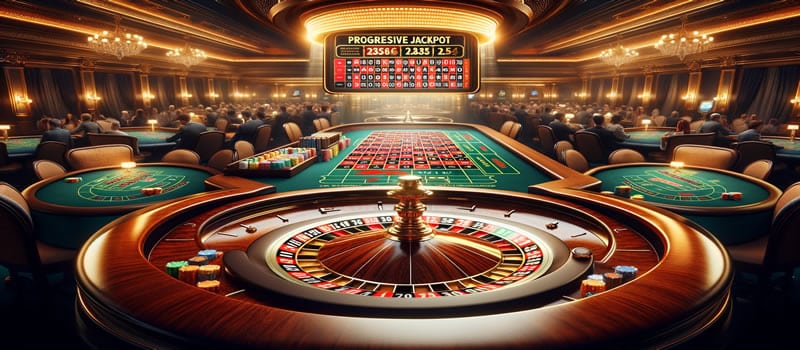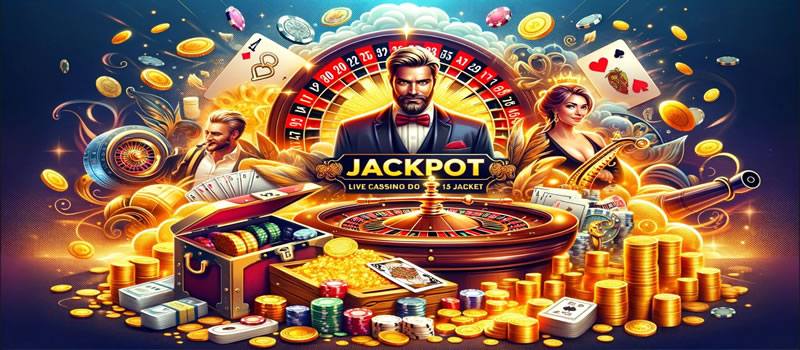The attraction of the jackpot is incredibly powerful that people from all walks of life find themselves captivated by it. It presents a nearly irresistible pull is the possibility of winning a sizable quantity of money through gaming at casinos, playing lotteries, or playing games of chance. For countless individuals worldwide, the idea of achieving sudden wealth and gaining financial independence in an instant is an alluring one. Several psychological factors play a role in the jackpot's attraction.
Key Takeaways
- The allure of the jackpot: The excitement of landing a huge win draws people in because of the potential for transformative gains.The dopamine-driven jackpot effect: Our brain's reaction to potential rewards, such as winning a jackpot, is driven by the release of dopamine, creating a feeling of pleasure and motivation.Risk and reward dynamics: The attraction to jackpots stems from the combination of risk with the possibility of reward, activating the brain's reward system.The psychology of hope and optimism: The possibility of winning big influences our outlook, fostering feelings of hope and optimism for the future.The impact of social and cultural factors: Our attraction to jackpots is influenced by societal values, cultural norms, and peer pressure.
The ability to indulge in luxuries without worrying about money and the possibility of becoming financially free are the main draws for many. The attraction of potentially being able to afford anything, such as luxurious clothing or exotic trips, pushes individuals to strive for big successes. Also, a major part of the jackpot's appeal comes from its unexpected nature & uncertainty. The rush can’t easily be replicated the excitement that is produced by the prospect of striking it lucky with a single lottery ticket purchase or by a large slot machine payout. The draw to jackpots also appeals to people's primal need for risk-taking and excitement.
The possibility of striking it rich offers an exciting new life free from the routine of day-to-day living. Lots of individuals are driven to chase after huge jackpots because they find great resonance in the concept of taking a risk & possibly coming out on top. The thrill of making a big wager or the suspense of waiting for the lottery results are just two examples of the many ways in which jackpots attract us because they represent human nature's need for thrills and adventures. Dopamine's Role in Anticipating Wins. Dopamine plays a major role in attracting us to potential rewards, which is why jackpots are irresistible.
A neurotransmitter called dopamine is released in reaction to enjoyable moments like eating delicious food, engaging in fun activities, and yes, hitting a huge win. Dopamine is essential in the brain's reward circuits. Dopamine is triggered in our brain in anticipation of a possible reward, like winning the lottery, which makes us feel good and makes us want to go after the reward even more. The dopamine-driven pursuit of huge wins. We are strongly motivated to seek out big wins by the strong attraction that is created when dopamine is released in response to possible rewards.
The possibility of winning a massive prize floods the brain with dopamine, which creates a rush of euphoria and excitement. It is this dopamine-driven reaction to possible rewards that fuels our craving to take risks in the hopes of striking it rich & pulls us towards jackpots. Addiction and compulsive behavior: dopamine’s downside. The brain floods dopamine when we anticipate a big win, which can create an extremely addictive feeling of hope and excitement. Gambling addiction often stems from this, which can be explained by dopamine's role in our draw to jackpots. A strong psychological pull that can result in addiction & a loss of self-control is driven by the dopamine released for big win potential.
Humans' innate drive for risk is closely tied to the the lottery's attraction. The possibility of striking it rich is a risky proposition that draws in our deep need for risk and excitement. Our interest in jackpots is fueled by the risk and excitement that comes with going after big victories. Many people are motivated by the idea of taking a risk and possibly earning huge rewards, which motivates them to gamble in the hopes of claiming the grand prize. Humankind’s history as hunter-gatherers may also provide insight into the role that risk and reward play in our fascination with jackpots.
Risk-taking was essential for survival throughout history because it frequently meant the difference between obtaining essential resources and going without. This behavior became beneficial in securing resources, it is ingrained in our brains to seek out high-reward risks. Our natural desire for risk and reward still shapes our actions today, leading us to chase jackpots and encourage us to take chances in the hopes of hitting big.
Risk and reward drive our pull to jackpots, which relates to our need for independence and control over our own lives. The potential for wealth presents an opportunity for limitless living and according to one's own terms. The opportunity to take a risk and possibly making huge gains appeals to our desire for control and personal agency, which motivates us to go for big wins in the quest for financial freedom. Our attraction to jackpots is largely driven by the optimism and hope that big wins inspire. The possibility of striking it rich provides a ray of hope for a brighter future, which fuels our ambition and inspires us to aim for large wins.
It is hard to ignore the sense of hope that comes from the thought that one fortunate event has the potential to improve our lives. The possibility of vast wealth draws on our innate yearning for optimism & hope, encouraging us to take chances in the quest for financial security and financial stability. The psychology of optimism and hope also deeply influences our mindset in the pursuit of big wins.
We are energized by hope and we are inspired to keep chasing after large wins despite the odds when we have the possibility of winning the jackpot. This feeling of anticipation can be highly addictive. We take risks in search of financial security because we have an unyielding optimism that one fortunate break could change our future. The role optimism plays in our mindset regarding jackpots also connects to our innate need to be in charge of our life choices. Our optimism is fueled by the possibility of striking it rich, which inspires us to take risks in the search for financial freedom and freedom from financial constraints. We can't ignore the power of social and cultural pressures on our attraction to jackpots.

We are bombarded with messages that strengthen the allure of striking it rich, from the popular media's portrayals of overnight millionaires to societal norms to achieve financial wealth. Our view of jackpots are shaped by the ubiquitous influence of social and cultural factors, which also feed our addiction to jackpots and encourage us to gamble in the quest for financial security. Peer pressure and cultural expectations are just two more examples of how social and cultural factors affect our craving for jackpots. Chasing big wins is regarded as an admirable, glitzy, and thrilling endeavor in many social circles.
Individuals might gamble more in an effort to gain validation or validation from others by experiencing the pressure to keep up with friends or coworkers who have made money through gambling. Our innate need for status is further evidenced by the influence of social and cultural factors on our attraction to jackpots. The reason we crave jackpots and pushes us to gamble in the hopes of hitting the jackpot is the chance for wealth and fame, which can further improve one's social status. The Addictive Nature of Jackpot Pursuits. The dopamine-driven reaction to prospective rewards can create a dangerous cycle that causes individuals to keep gambling in the hopes of winning big, often at a huge cost.
Chasing losses can create a harmful pattern that could seriously impact someone's finances and general well-being. Jackpots' Dark Side: Mental Health Effects. Pursuing big wins can take a toll on personal relationships and emotional well-being in addition to financial losses. Gambling addicts frequently struggle with ever-growing debts & money problems, which can create anxiety, depressed, and feelings of despair.
In addition, gambling for jackpots can strain bonds with friends & family, leading to isolation & loneliness. Support and Awareness live casinos promotions for Addicts. The dangers of chasing jackpots make it clear that people who may be experiencing compulsive gambling behavior need more understanding and assistance.
Society must understands the possible risks associated with chasing jackpots and provide help to individuals who may be at risk of developing addictive behaviors. By doing this, we can work towards a safer environment and more encouraging for people who might be having trouble the temptation of jackpots. Create healthy gambling habits to allow people to control the emotional impact of jackpot chasing.

Individuals can find alternatives to manage their stress without turning to high-risk gambling activities by exercising regularly, practicing mindfulness, or finding enjoyable hobbies and pastimes. In conclusion, individuals of all backgrounds are drawn to the jackpot because of its strong allure. The appeal of large wins is driven by a variety of psychological factors, ranging from the release of dopamine in reaction to possible rewards to our natural craving for risk. However, to avoid falling into gambling addiction, people should be aware of the possible risks involved in jackpot pursuits and adopt healthy habits for managing the emotional effects.
People can experience the excitement of chasing large wins without succumbing to addiction by understanding the mental triggers behind jackpot attraction & adopting positive, healthy gambling habits.
FAQs
What is the psychology behind the attraction to winning big jackpots?
Our interest in large jackpots is rooted in the human brain's reward system. When we anticipate the possibility of winning a large sum of money, our brains produce dopamine, a neurotransmitter linked to joy and reward-seeking. This dopamine release creates a feeling of excitement and creates hope, which can be highly addictive.
What keeps people playing after they lose?
Gamblers keep playing despite losses because of the phenomenon known as "near-miss" experiences. When players almost win, it creates a dopamine boost just like that of an actual win. This close-call event can create a sense of hope and drives them to keep playing, even when they’ve lost before.
What role does social influence play in the attraction to winning big jackpots?
Social factors are key in our craving for jackpots. The prominence of jackpot winners in the public eye and within social circles builds social validation, leading individuals to believe that winning is achievable and worth pursuing. Additionally, the excitement and celebration surrounding jackpot wins can influence others to participate in similar activities.

Are there any potential negative effects of the attraction to winning big jackpots?
The attraction to winning big jackpots can lead to potential negative effects, particularly when gambling becomes addictive. Excessive gambling in pursuit of big wins can cause financial problems, damage personal relationships, and mental health issues. Moreover, the craving for jackpots can create false hope and a distorted perception of probability.
How can individuals manage their attraction to winning big jackpots in a healthy way?
You can keep jackpot cravings under control in a healthy way by setting limits on their gambling behavior, gambling responsibly, and seeking support if they feel their attraction to jackpots is becoming problematic. It's important to keep gambling in perspective and to prioritize enjoyment and entertainment over the pursuit of large wins.